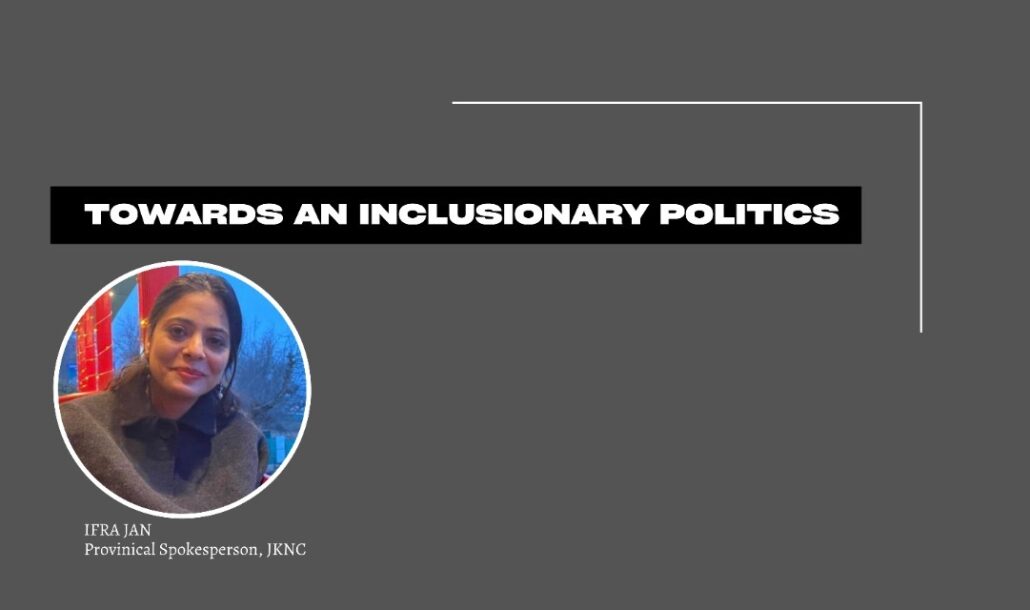
Ifra Jan
The personal is political. It has been almost two years since I joined electoral politics, but I also happen to be right at the bottom of the societal hierarchical ladder. You have never heard of my family name, right? No “khandaan”. A child of a single mother? Well, abhorrent. A woman who is politically loud and unapologetic? Well, I guess I must stop now before you stop reading this column, but I’m sure you understand the premise.
Yet, none of this traditional conditioning and none of these baseless tropes mattered to the National Conference when I, a complete political novice, was on day one of my joining, chosen as a spokesperson for the largest party of J&K, because that is the mindset that the party professes and propagates. However, this journey has not been an easy one.
I have been told, through multiple videos, by my learned political opponents, that I “belong to the kitchen”, that I “need to get married”, that I need to “let the men do the talking”, and on a live TV show no less, I have been asked to demonstrate my “credentials”. It is amusing that this same set of people are the loudest when it comes to criticizing “Dynastic Politics”. They’re the same ones who ask me what family I come from. People who crib the loudest about “Dynastic Politics” happen to be the very same ones who ask me what my “family background” and my “credentials” are. These are very veiled, cryptic questions, spouted at me to tell me that I don’t belong in politics, while the same group pretends to stand for non-dynastic politics. I am not the victim here, as I couldn’t care less about what they say, and nor do I seek any sympathy. I have shared my personal experience here to convey my amusement at this theatre of absurdity, duplicity and hypocrisy.
To have it ingrained in oneself, that only one kind of people, who are born into a specific gender, family or, possess a certain marital status, can be ‘respectable politicians’ is a disease that afflicts the critics of ‘dynastic politicians’ far more than the ones who are born in political families. It is a mindset problem, and not a problem of which family one is born in. A second-generation politician can be far more welcoming to a new one, than a first-generation politician. Just like a man can be a supporter of women’s rights, but some woman may not be.
It eerily reminds me of a child rights activism group in Delhi, who after shouting the loudest in the dharna chowk, would go to a dhaba where a child worker would serve them tea. It is the same case with these ‘dynastic politics’ critics who after giving lectures on dynasty would tell a newcomer that this politics is reserved for them. It is not inclusive politics that they demand, it is merely an exclusive entry for themselves which they’re interested in, while the supposedly ‘dynastic leaders’ have created avenues for fresh voices from different strata to find representation in the political spectrum. It’s not a matter of principle, but one of selfishness.
To be born in a political family and joining politics is benign. I see lawyers’ children talking about their parents’ profession, doctors’ children choosing medicine all the time, and children of businessmen or businesswomen choosing their parents’ profession. Choosing what your father did, because you have received the benefits of the generational knowhow, lessons and experiences is but natural. While talking to a senior second-generation lawyer once, I was told that ever since she was a child, all she had heard was ‘Bail, FIR’ etc., and therefore choosing law came naturally to her. I don’t see why I must hate her. As a civil rights lawyer, she is at the forefront of protecting marginalized communities from violence and oppression.
That is the exact scenario with politicians who chose their parents’ profession. To hate them for the choice of career they have made is vile, because it is not based on substance, but rather, on preconceived notions that people have in their minds. I repeat, at the risk of alienating the reader, that this stems from a mindset problem, but what one must strive for is inclusive politics, where no one is hounded out for what his/her identity may be. I have narrated a small part of my personal experience here to demonstrate that contrary to the BJP tagline that we need “Dynasty Free” politics, which is just another way of maligning the Opposition, in reality, we need inclusive politics. Politics where a person’s gender, marital status, family status, caste would not matter, and the only consideration would be that the candidate is assessed on his or her own personhood, and what he or she brings to the table. This “non-discrimination” would also include not criticizing or hating a person simply because his/her father happens to be a politician, something that is beyond a person’s control.
And as I conclude, it is pertinent to mention that this debate on Inclusionary Politics should, in no case, be allowed to be hijacked by a cabal that merely seeks the end of any credible opposition in our country.
(Ifra Jan is the Provincial spokesperson of the JKNC and currently pursuing her Masters in Law at the University of Oxford. Views expressed are personal. She can be reached at ifrahjan14@gmail.com




